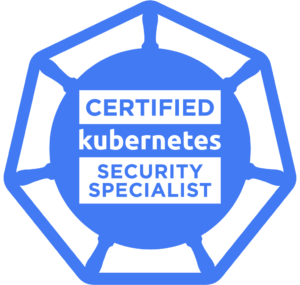
Hello everyone.
I would like to share my experience of successfully passing the Certified Kubernetes Security (CKS) exam from the Linux Foundation . This exam, as you might guess, tests our ability to configure various aspects of the security of the Kubernetes cluster and the applications running on it. I liked the exam, it looks at security from various points of view, and also uses very useful external tools such as Falco, Trivy, kube-bench, Open Policy Agent, gVisor, etc. The exam itself seemed to me moderately difficult, unlike CKA, which is more geared towards newcomers to Kubernetes.
I will first talk about the exam and preparation for it in general, and then move on to the topics covered in the exam.
At the moment, there are only two Kubernetes security exams - this is, in fact, CKS itself, as well as the Red Hat Certified Specialist in Security: Containers and OpenShift , dealing with OpenShift security. These two exams overlap in many ways, but according to Openshift, I think the exam is still more difficult (I successfully failed it).
The exam costs $ 300 separately , the official Kubernetes Security Fundamentals (LFS260) course costs $ 299 , you can buy the course and exam together for $ 499 . I bought the course and exam together for $ 200 at the traditional Linux Foundation New Year Sale.
CKS CKA (Certified Kubernetes Administrator). CKS, , CKA. , CKS CKA.
. :
Linux Foundation: Kubernetes Security Fundamentals (LFS260). Linux Foundation, . , , , , - PDF ( , ?!), . , . , .
Udemy 3599 . , " ", . , , . https://killer.sh. , , .. - . , , .. , . , .
15-20 , 2 .. 6-8 . . , Kubernetes killer.sh, 1 40 .
67%, . , "".
. , .
- . CKS. :
Cluster Setup (10%)
Use Network security policies to restrict cluster level access
Use CIS benchmark to review the security configuration of Kubernetes components (etcd, kubelet, kubedns, kubeapi)
Properly set up Ingress objects with security control
Protect node metadata and endpoints
Minimize use of, and access to, GUI elements
Verify platform binaries before deploying
Cluster Hardening (15%)
Restrict access to Kubernetes API
Use Role Based Access Controls to minimize exposure
Exercise caution in using service accounts e.g. disable defaults, minimize permissions on newly created ones
Update Kubernetes frequently
System Hardening15%
Minimize host OS footprint (reduce attack surface)
Minimize IAM roles
Minimize external access to the network
Appropriately use kernel hardening tools such as AppArmor, seccomp
Minimize Microservice Vulnerabilities (20%)
Setup appropriate OS level security domains e.g. using PSP, OPA, security contexts
Manage Kubernetes secrets
Use container runtime sandboxes in multi-tenant environments (e.g. gvisor, kata containers)
Implement pod to pod encryption by use of mTLS
Supply Chain Security20%
Minimize base image footprint
Secure your supply chain: whitelist allowed registries, sign and validate images
Use static analysis of user workloads (e.g.Kubernetes resources, Docker files)
Scan images for known vulnerabilities
Monitoring, Logging and Runtime Security20%
Perform behavioral analytics of syscall process and file activities at the host and container level to detect malicious activities
Detect threats within physical infrastructure, apps, networks, data, users and workloads
Detect all phases of attack regardless where it occurs and how it spreads
Perform deep analytical investigation and identification of bad actors within environment
Ensure immutability of containers at runtime
Use Audit Logs to monitor access
, , , - . , , . .
. Falco Sysdig. Linux , . Falco , :
hostPID
hostNetwork
hostPath
,
/etc
IP-
... .
, Falco Kubernetes, Kubernetes API, :
hostPID
hostNetwork
.
kube-system
ClusterRoleBinding
cluster-admin
... .
, Falco . , .. , . , Falco , .
Kubernetes, RBAC , Open Policy Agent (OPA). Kubernetes , Rego. Kubernetes validating admission webhook OPA Gatekeeper. Custom Resource Definition. , costcenter.
apiVersion: templates.gatekeeper.sh/v1beta1
kind: ConstraintTemplate
metadata:
name: k8srequiredlabels
spec:
crd:
spec:
names:
kind: K8sRequiredLabels
validation:
openAPIV3Schema:
properties:
labels:
type: array
items: string
targets:
- target: admission.k8s.gatekeeper.sh
rego: |
package k8srequiredlabels
violation[{"msg": msg, "details": {"missing_labels": missing}}] {
provided := {label | input.review.object.metadata.labels[label]}
required := {label | label := input.parameters.labels[_]}
missing := required - provided
count(missing) > 0
msg := sprintf("you must provide labels: %v", [missing])
}
---
apiVersion: constraints.gatekeeper.sh/v1beta1
kind: K8sRequiredLabels
metadata:
name: ns-must-have-costcenter
spec:
match:
kinds:
- apiGroups: [""]
kinds: ["Namespace"]
parameters:
labels: ["costcenter"]
costcenter :
Error from server (you must provide labels: "costcenter"): error when creating "ns.yaml": admission webhook "validating-webhook.openpolicyagent.org" denied the request: you must provide labels: "costcenter"
OPA Gatekeeper , , .. Kubernetes, , . , Gatekeeper mutating webhook, .. , .
, Rego playground, . , Kubernetes, .
, , Trivy Aquasecurity. , , , Clair, .
:
Network Policy. , from to . .
RBAC.
Role
ClusterRole
,RoleBinding
ClusterRoleBinding
. ,ClusterRole
ClusterRoleBinding
, ,RoleBinding
,ClusterRole
( ,admin
,edit
view
, ).
Role
RoleBinding
, , . , .
, , , ("Authorization: Bearer $TOKEN" ).
Kubernetes. Falco, . , kube-apiserver, .
Kube-bench. .
kube-apiserver, kube-scheduler, kube-controller-manager kubelet. , kubeadm, . , , , kube-apiserver, , (
/var/log/pods/*
), .. .
kubeadm .
YAML- Kubernetes . , , , .
-
-
AppArmor. AppArmor . (!)
Seccomp. , AppArmor.
RuntimeClass, gVisor. , , .
PodSecurityPolicy (PSP). , PSP , .. , , AppArmor securityContext,
defaultAllowPrivilegeEscalation
defaultAddCapabilities
.
, PodSecurityPolicy use PSP . .
Kubernetes Dashboard. Kubernetes Dashboard, , .
(, Chrome, Vivaldi). :
, . https://kubernetes.io/docs.
, Certified Kubernetes Security.